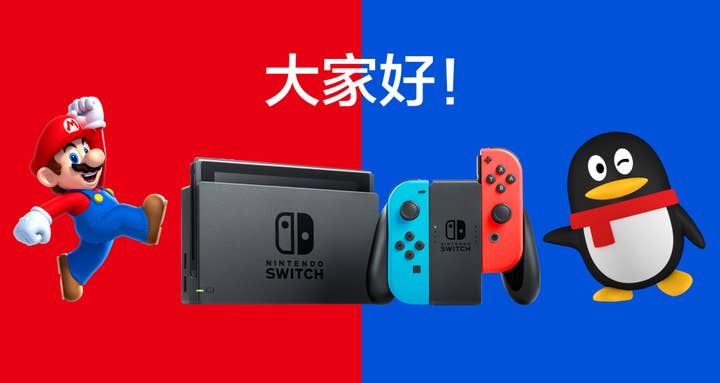Nintendo Switch ending online support exposes fragility of gaming partnerships in China | Opinion
Daniel Camilo explains how, in the end, consumers get the short end of the stick
It has been reported that Nintendo announced a discontinuation of its online services for the Nintendo Switch in China.
This might seem like a very dramatic development with a profound impact on the console's life in China, but actually, it's not. I want to try to explain what this means as best as I can, as it fundamentally concerns one of the topics I most recurrently write about and comment on: console market dynamics in China.
First, it is wise to look at the actual announcement from the source: Tencent's webpage for the Chinese Switch. It's all in Chinese, but thankfully automatic translations are actually pretty good nowadays, so that shouldn't be an issue for most people.
We can read that the "Nintendo Switch in China will gradually stop the Nintendo e-shop and other network-related operating services from March 31, 2026 to May 15, 2026." Plus, Nintendo/Tencent will be "…launching a 'reward plan' for all Nintendo Switch users in China."
Nintendo did not make the decision to cut short the life of the Switch in China
That reward plan includes four redeemable, downloadable games from the Chinese e-Shop, meaning only users with an associated mainland Chinese WeChat ID will be able to redeem said games (WeChat is owned by Tencent, by the way).
The list of games available includes only some that have been licensed for publishing and distribution in mainland China. It is a very meager list, although it does include some very good titles (that most Switch users already own).
As I've been alluding to, Tencent is very much involved in the distribution of the Chinese Nintendo Switch. If you're wondering why I'm giving the console its own nationality, that is because the gaming market in China is greatly composed of content that is licensed for publishing/distribution/commercialization in the country, and content that is not. I have written on the subject extensively. Also, back in 2021 I wrote specifically about the distribution deal made between Tencent and Nintendo for the Switch in China. That linked article provides some still-relevant context.
If you're not willing to read any of that, I'll briefly sum it up: for consoles and their respective games in particular, most of the Chinese market is made up of imported goods, both physically and digitally. Most PlayStation, Xbox and Nintendo consoles sold in the country are imported and widely available and sold through e-commerce platforms.
These SKUs compete directly with Chinese licensed ones in the same spaces. Most consoles and imported physical games originate either from Hong Kong, Taiwan, and Japan, with a minor amount originating from other regions. Yes, China is effectively inflating sales for all those markets, but that's another topic.
Digital games, when bought in imported consoles using accounts from other countries, are also technically imported purchases.
Basically this happens because very few games actually get a publishing license for mainland China (due to strict regulations), and therefore many (most?) consumers prefer buying imported region-free consoles that are easily available at very competitive prices. Officially licensed consoles commonly have at least some of their online services region-locked (restricted) and therefore greatly limit the experience of their users. For the sake of this article's focus, I will ignore PC and mobile gaming here.
And so we circle back to the issue at hand with Tencent's Nintendo Switch...

Why is this happening now?
Every non-Chinese gaming studio, gaming publisher and gaming manufacturer who wishes to directly make business in Mainland China is required by law to have a Chinese partner. That is, to have a Chinese company doing the work for them in the country. In the case of a game wishing to officially and fully legally launch in China, it needs a Chinese publisher to operate the game in China. This is a complex topic, but generally this is how it works.
For the distribution/operation of the Switch, Nintendo partnered with Tencent and officially launched the console in China in 2019, two and a half years after its international debut.
I'm not going to pretend I know the details of the deal between Tencent and Nintendo, but I know enough from my professional experience in the publishing world in China, and from interpersonal exchanges, to understand that a distribution deal such as this one operates more or less within the same general molds of a publishing deal. It is contractual, timelines are set in advance, economic/sales goals are established, and technical operations are fully handled by the Chinese side. In this case, Tencent.
Nintendo did not make the decision to cut short the life of the Switch in China.
This is the important point that people looking in from outside of China need to understand. And yes, this is effectively cutting short the life of the Chinese licensed console in the country. Even knowing that Nintendo will very likely reveal the Switch 2 in 2025, and probably even release it next year, it is unfathomable to expect online services for the console being cut as early as 2026 in most markets. The console will almost surely be supported years after the next iteration comes along.
The Chinese Switch, just like the Chinese PS5 or the Chinese Xbox, are not about the long-lasting visions of Nintendo, Sony and Microsoft. They are, fundamentally, the ambition of their Chinese counterparts
Online support is being terminated in China because of Tencent and/or involved Chinese parties. This is not an accusation. It is simply stating that Tencent is the one managing the console and its digital maintenance in China, and therefore this sudden announcement is a consequence of whatever is happening, and/or decided on Tencent's camp.
We do not know yet why exactly this is happening, as of the time of this writing. A lot of more-or-less well-informed speculation has been shared on the Chinese webs from different sources, but so far the most likely scenario is that one of Tencent's partners is unable to continue to provide online services.
This information has been reported (but not confirmed) by one of the best online sources for information on Nintendo in China, Chinese Nintendo on X.
The Chinese Nintendo account (not affiliated with Nintendo) reported that "TNS online service was run by a long-time partner of Nintendo, but said partner would no longer be available due to their recent change in their business in China."
This seems to be a plausible and likely explanation, even if details are still obscure. Besides, I could speculate that the contract between Tencent and Nintendo is simply running to its pre-established undisclosed end, and the announcement for the termination of services comes as a natural consequence of that. Perhaps it is a mix of both? Hard to tell, at the moment.
What about the people who own the Chinese Switch?
This should be the primary concern of any discussion addressing this topic. After all, what is the gaming industry without its users, its customers, its fans? Nothing. It doesn't give me any pleasure to tackle subjects from a negative perspective, but as I made it clear with the title of this article, a happy story this is not.
What is happening now with the Chinese Switch was almost entirely predictable, in the sense that we know these are product-specific deals (the partnership between Tencent and Nintendo) with hardline parameters and short to medium-term goals. The Chinese Switch, just like the Chinese PS5 or the Chinese Xbox, are not about the long-lasting visions of Nintendo, Sony and Microsoft. They are, fundamentally, the ambition of their Chinese counterparts.
To be clear, of course these consoles only exist thanks to their original makers and in-house brand support. But the China-specific operations 'belong' to the Chinese partners for the most part, and in this case, Nintendo simply does not have the legal authority to take matters into its own hands and 'fix' the issue as it more easily could in less restrictive markets.
If nothing changes beyond this announcement, the people who bought the Chinese Switch will be left with an offline-only machine (I will not address piracy and rooting here, obviously), usable only with the games they already acquired, sans online functionalities for said games.

More informed consumers, however, who bought imported models of the console will not be affected by this whatsoever. Indeed, their choice to ignore the Chinese model will be more justified than ever, and it will further motivate sellers in the country to continue to import and sell consoles to the many millions who continue to increase demand for console gaming in China.
As somewhat of a silver lining, I would say that Tencent's partnership with Nintendo is not without its merits. If nothing else, their heavy marketing efforts in the country did boost brand awareness for Nintendo among hundreds of millions of potential new consumers. If the Chinese Switch didn't sell as much as Tencent likely expected and desired, it undoubtedly fueled interest for the millions of imported consoles that continue to be sold across China and made the Switch the de facto most popular console in the country for the last decade (even if we can't accurately measure total sales, due to the aforementioned complexities of the Chinese gaming market).
What is happening now with the Chinese Switch was almost entirely predictable
The shutting down of online services and the eShop mean that all Switch games with a Chinese publishing license will no longer be available for download. While physical copies for most of these games are available, their run is fairly limited and not being reprinted for, presumably, most of them. Chinese users are primarily digital-first consumers, and it is safe to assume the vast majority of Chinese Switch games sold digitally.
What happens to the publishing licenses of these games? Possibly, they might be used to accelerate the official release of new upcoming games, as the recycling of publishing licenses for games in China is common practice, even if not openly admitted in formal channels. Publishing licenses for games are hard to come by and coveted by publishers in the country. Fairly regularly, publishers will sell, resell, or 'recycle' these licenses (ISBN) to be used with newer games. It is somewhat of an obscure and not entirely legal practice, but one that is common anyway.
If these Chinese editions of Switch games do not return to the eShop, I would not be surprised to see a larger portfolio of Switch 2 games rapidly available once the console gets officially released in China. A lot of those 'phantom' publishing licenses could end up being used for the next console's launch line-up in China, in order to decrease the usual months taken to process licenses.
Daniel Camilo is a business development and gaming consultant based in Shenzhen, China
